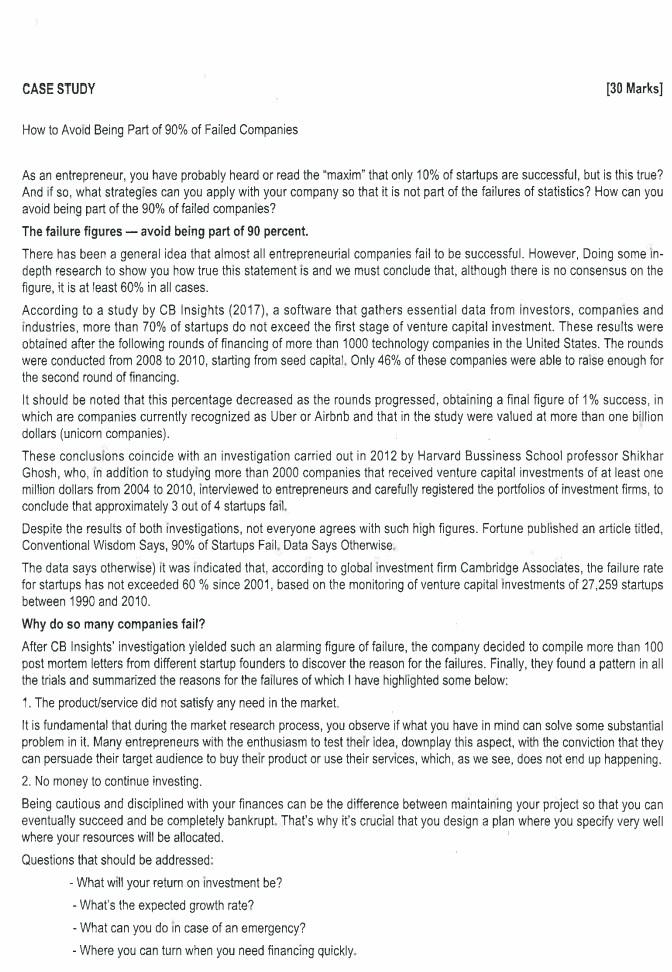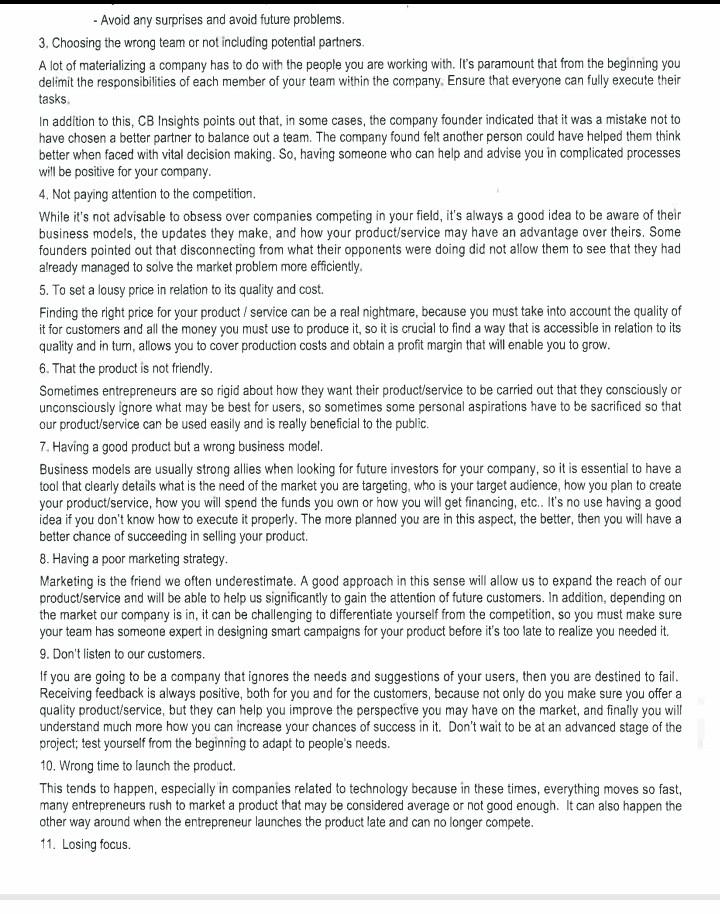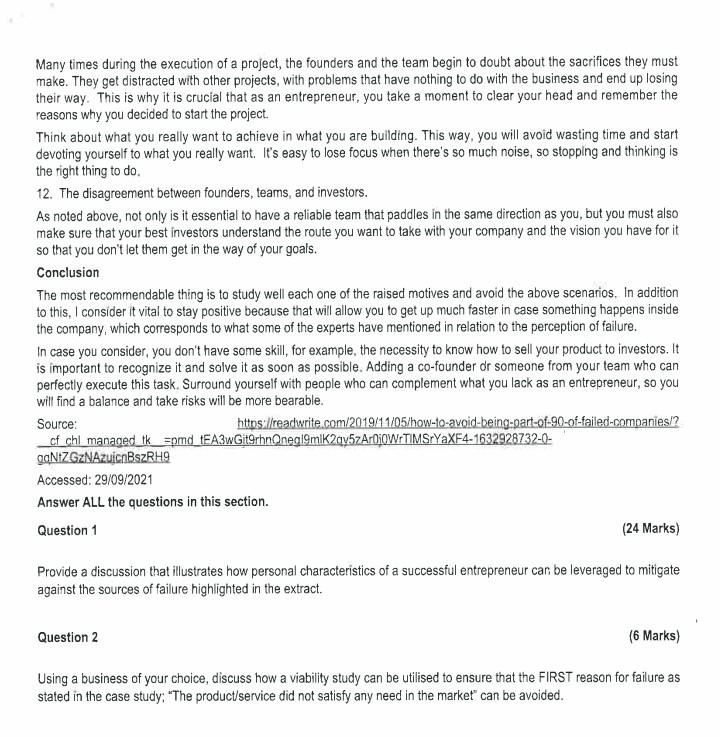Answered step by step
Verified Expert Solution
Question
1 Approved Answer
Please assist in answering all questions How to Avoid Being Part of 90% of Failed Companies As an entrepreneur, you have probably heard or read



Please assist in answering all questions
How to Avoid Being Part of 90% of Failed Companies As an entrepreneur, you have probably heard or read the "maxim" that only 10% of startups are successful, but is this true? And if so, what strategies can you apply with your company so that it is not part of the failures of statistics? How can you avoid being part of the 90% of failed companies? The failure figures - avoid being part of 90 percent. There has been a general idea that almost all entrepreneurial companies fail to be successful. However, Doing some indepth research to show you how true this statement is and we must conclude that, although there is no consensus on the figure, it is at least 60% in all cases. According to a study by CB Insights (2017), a software that gathers essential data from investors, companies and industries, more than 70% of startups do not exceed the first stage of venture capital investment. These results were obtained after the following rounds of financing of more than 1000 technology companies in the United States. The rounds were conducted from 2008 to 2010 , starting from seed capital. Onfy 46% of these companies were able to raise enough for the second round of financing. It should be noted that this percentage decreased as the rounds progressed, obtaining a final figure of 1% success, in which are companies currently recognized as Uber or Airbnb and that in the study were valued at more than one billion dollars (unicom companies). These conclusions coincide with an investigation carried out in 2012 by Harvard Bussiness School professor Shikhar Ghosh, who, in addition to studying more than 2000 companies that received venture capital investments of at least one million dollars from 2004 to 2010 , interviewed to entrepreneurs and carefully registered the portfolios of investment firms, to conclude that approximately 3 out of 4 startups fail. Despite the results of both investigations, not everyone agrees with such high figures. Fortune published an article titled, Conventional Wisdom Says, 90% of Startups Fail. Data Says Otherwise. The data says otherwise) it was indicated that, according to global investment firm Cambridge Associates, the failure rate for startups has not exceeded 60% since 2001 , based on the monitoring of venture capital investments of 27,259 startups between 1990 and 2010. Why do so many companies fail? After CB Insights' investigation yielded such an alarming figure of failure, the company decided to compile more than 100 post mortem letters from different startup founders to discover the reason for the failures. Finally, they found a pattern in all the trials and summarized the reasons for the failures of which I have highlighted some below: 1. The product/service did not satisfy any need in the market. It is fundamental that during the market research process, you observe if what you have in mind can solve some substantial problem in it. Many entrepreneurs with the enthusiasm to test their idea, downplay this aspect, with the conviction that they can persuade their target audience to buy their product or use their services, which, as we see, does not end up happening. 2. No money to continue investing. Being cautious and disciplined with your finances can be the difference between maintaining your project so that you can eventually succeed and be completely bankrupt. That's why it's crucial that you design a plan where you specify very well where your resources will be allocated. Questions that should be addressed: - What will your return on investment be? - What's the expected growth rate? - What can you do in case of an emergency? - Where you can turn when you need financing quickly. - Avoid any surprises and avoid future problems. 3. Choosing the wrong team or not including potential partners. A lot of materializing a company has to do with the people you are working with. It's paramount that from the beginning you delimit the responsibilities of each member of your team within the company. Ensure that everyone can fully execute their tasks. In addition to this, CB Insights points out that, in some cases, the company founder indicated that it was a mistake not to have chosen a better partner to balance out a team. The company found felt another person could have helped them think better when faced with vital decision making. So, having someone who can help and advise you in complicated processes will be positive for your company. 4. Not paying attention to the competition. While it's not advisable to obsess over companies competing in your field, it's always a good idea to be aware of their business models, the updates they make, and how your product/service may have an advantage over theirs. Some founders pointed out that disconnecting from what their opponents were doing did not allow them to see that they had already managed to solve the market problem more efficiently. 5. To set a lousy price in relation to its quality and cost. Finding the right price for your product / service can be a real nightmare, because you must take into account the quality of it for customers and all the money you must use to produce it, so it is crucial to find a way that is accessible in relation to its quality and in tum, allows you to cover production costs and obtain a profit margin that will enable you to grow. 6. That the product is not friendly. Sometimes entrepreneurs are so rigid about how they want their product/service to be carried out that they consciously or unconsciously ignore what may be best for users, so sometimes some personal aspirations have to be sacrificed so that our product/service can be used easily and is really beneficial to the public. 7. Having a good product but a wrong business model. Business models are usually strong allies when looking for future investors for your company, so it is essential to have a tool that clearly details what is the need of the market you are targeting, who is your target audience, how you plan to create your product/service, how you will spend the funds you own or how you will get financing, etc.. It's no use having a good idea if you don't know how to execute it properly. The more planned you are in this aspect, the better, then you will have a better chance of succeeding in selling your product. 8. Having a poor marketing strategy. Marketing is the friend we often underestimate. A good approach in this sense will allow us to expand the reach of our product/service and will be able to help us significantly to gain the attention of future customers. In addition, depending on the market our company is in, it can be challenging to differentiate yourself from the competition, so you must make sure your team has someone expert in designing smart campaigns for your product before it's too late to realize you needed it. 9. Don't listen to our customers. If you are going to be a company that ignores the needs and suggestions of your users, then you are destined to fail. Receiving feedback is always positive, both for you and for the customers, because not only do you make sure you offer a quality product/service, but they can help you improve the perspective you may have on the market, and finally you will understand much more how you can increase your chances of success in it. Don't wait to be at an advanced stage of the project; test yourself from the beginning to adapt to people's needs. 10. Wrong time to launch the product. This tends to happen, especially in companies related to technology because in these times, everything moves so fast, many entrepreneurs rush to market a product that may be considered average or not good enough. It can also happen the other way around when the entrepreneur launches the product late and can no longer compete. 11. Losing focus. Many times during the execution of a project, the founders and the team begin to doubt about the sacrifices they must make. They get distracted with other projects, with problems that have nothing to do with the business and end up losing their way. This is why it is crucial that as an entrepreneur, you take a moment to clear your head and remember the reasons why you decided to start the project. Think about what you really want to achieve in what you are building. This way, you will avoid wasting time and start devoting yourself to what you really want. I''s easy to lose focus when there's so much noise, so stopping and thinking is the right thing to do. 12. The disagreement between founders, teams, and investors. As noted above, not only is it essential to have a reliable team that paddles in the same direction as you, but you must also make sure that your best investors understand the route you want to take with your company and the vision you have for it so that you don't let them get in the way of your goals. Conclusion The most recommendable thing is to study well each one of the raised motives and avoid the above scenarios. In addition to this, I consider it vital to stay positive because that will allow you to get up much faster in case something happens inside the company, which corresponds to what some of the experts have mentioned in relation to the perception of failure. In case you consider, you don't have some skill, for example, the necessity to know how to sell your product to investors. It is important to recognize it and solve it as soon as possible. Adding a co-founder dr someone from your team who can perfectly execute this task. Surround yourself with people who can complement what you lack as an entrepreneur, so you will find a balance and take risks will be more bearable. Source: httos:il/readwrite.com/2019/11/05/how-to-avoid-being-0art-of-90-of-failed-companies/? cf chl managed tk =pmd tEA3wGitgrhnOnegl9miK2qu57Ar0i0WrTIMSrYaXF4-1632928732-0- gONTZGENAZUICMBszRHQ Accessed: 29/09/2021 Answer ALL the questions in this section. Question 1 (24 Marks) Provide a discussion that illustrates how personal characteristics of a successful entrepreneur cari be leveraged to mitigate against the sources of failure highlighted in the extract. Question 2 (6 Marks) Using a business of your choice, discuss how a viability study can be utilised to ensure that the FIRST reason for failure as stated in the case study; "The product/service did not satisfy any need in the market" can be avoidedStep by Step Solution
There are 3 Steps involved in it
Step: 1

Get Instant Access to Expert-Tailored Solutions
See step-by-step solutions with expert insights and AI powered tools for academic success
Step: 2

Step: 3

Ace Your Homework with AI
Get the answers you need in no time with our AI-driven, step-by-step assistance
Get Started


